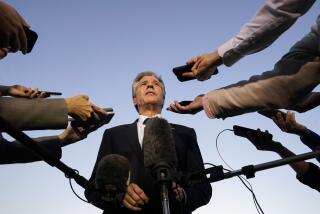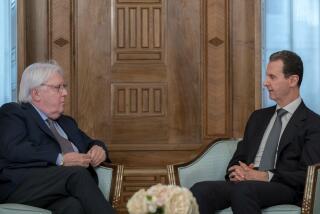Heat on Arab Moderates
- Share via
The heads of 22 Arab League states are preparing to meet in Cairo this weekend to express support for the Palestinians and to debate whether the peace process should be discarded in favor of a militant united front against Israel. That will be the line taken by rejectionists such as Libya, Syria and Iraq. Iraq’s Saddam Hussein is expected to show up at the conference to repeat the threats of destruction he has been making against Israel--from a safe distance--since Palestinian-Israeli violence erupted three weeks ago.
Arab summits tend not to be an ideal venue for calm strategic thinking. Moderate views often get swamped in a sea of radical rhetoric, and the consensus that emerges can lead to policy paralysis. The 1967 Arab summit in Khartoum, held a few months after Israel’s victory in the Six-Day War, bound all Arab states to the famous three no’s of policy toward Israel: “No peace. No negotiation. No recognition.” That defiant but sterile formula slammed shut the window of opportunity briefly opened by Israel’s offer to withdraw from nearly all the territory it had captured in exchange for peace. And it set the stage for a new and hugely costly war six years later.
Egypt and Jordan could come under particular pressure at the conference. They are the only two Arab states that have full diplomatic relations with Israel, and they enjoy close ties to the United States, which has provided them with billions in economic and military aid. Egypt’s President Hosni Mubarak and King Abdullah II of Jordan know that their countries’ future progress and security depend on stability and that among outside powers only the United States can influence all parties.
Palestinian leader Yasser Arafat wants the Cairo conference to show that he has united Arab backing. The Palestinians aren’t especially popular in the Arab world, but their confrontation with Israel has evoked admiration and calls for support, not least in Egypt and Jordan. Arafat will get what he wants. The challenge to Mubarak, Abdullah and other moderates is to assure that while that’s being done, the opportunity for eventually moving on with the peace process doesn’t get buried.
More to Read
Sign up for Essential California
The most important California stories and recommendations in your inbox every morning.
You may occasionally receive promotional content from the Los Angeles Times.












